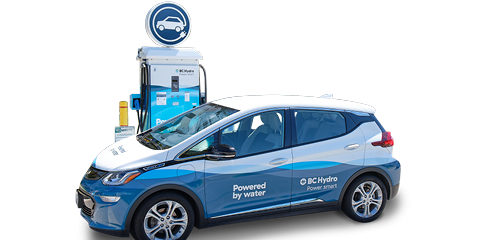Charge on the go with public EV chargers
There are now thousands of electric vehicle (EV) public chargers in B.C., and they're becoming much more common across North America. Whether you're filling up for your daily commute or a scenic road trip, B.C.'s clean electricity can power your journey.
Charging networks in B.C.
The majority of B.C.'s public chargers require drivers to join a service network to use them. Once you've registered with a network, you'll be sent a member card which you can use to pay at the EV charger. Some networks' chargers can also be accessed using a smartphone app or a credit card. And obviously, if you register with multiple networks, you get access to more chargers.
Currently, there are seven main networks in B.C.:
- BC Hydro
- ChargePoint*
- FLO*
- Shell Recharge (for fast charging ports)
- Petro-Canada
- Tesla (for Tesla vehicles)
- On-the-Run
*As a member of the BC Hydro EV charging network, you can charge your vehicle at any of our roaming partner chargers in North America.
Two other keys to this community

Learn about BC Hydro's network
BC Hydro currently operates hundreds of fast chargers located along B.C.'s major highways. Learn more about our network, and how to use our chargers.
Using BC Hydro fast chargers
If you're new to using a fast charger, or need help, we've got you covered. Visit our help centre for assistance with charging basics, questions about charging, and our mobile app.
Plan your next road trip
With the average range of EVs increasing and charging networks expanding across Canada and the US, it's easy to take a road trip in your EV. We've made planning simple with tips and itineraries to help you make the most out of your next trip.


